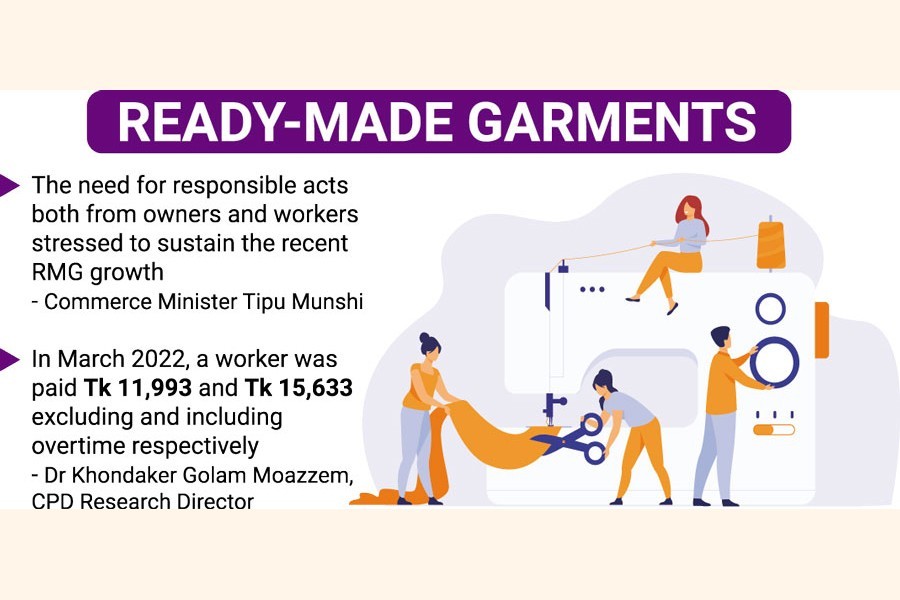Garment workers have hardly benefitted out of their increased workload for a rise in locally-made apparel export orders, according to a joint study.
Increased export orders has come in the form of excessive pressure for the workers leading to a rise in their income both including and excluding overtime payment in recent months.
At the same time, the study says, the workers' monthly expenditure has substantially increased.
"Although the monthly income of an RMG worker increased by 1.7 per cent in March 2022, their family expenditure swelled by 9.5 per cent," it adds.
As a result, garment workers are facing hardship to maintain their family expenses while a large part of their enhanced income only meets inflationary pressure.
The findings were shared at a dialogue co-hosted by the Centre for Policy Dialogue and the Christian Aid in Bangladesh at Brac Centre Inn in Dhaka on Wednesday.
Commerce minister Tipu Munshi was present as the chief guest at the event with CPD executive director Dr Fahmida Khatun in the chair.
CPD research director Dr Khondaker Golam Moazzem made a presentation on the findings of the joint study styled 'Debate on Recent Export Growth and Decent Employment in RMG Industry: A UNGPs Perspective'.
A total of 51 factories having 12 mean years of operation and 1,244 workers located in Dhaka and nearby areas, including Savar, Narayanganj and Gazipur, were surveyed.
In March 2022, a worker was paid Tk 11,993 and Tk 15,633 excluding and including overtime respectively, says Mr Moazzem while presenting the findings.
"Such a rise in wage payment is perhaps related to their higher number of work hours and workdays to meet the commitment of timely shipment of export orders."
According to Mr Moazzem, a number of new subcontracting factories have sprouted due to higher export orders, and child and juvenile workers are being hired in these factories to meet worker shortages.
In the post-pandemic period, he says, local RMG industry has demonstrated a strong recovery with consistent high export growth particularly in the last fiscal year.
Except July 2021, he adds, the month-on-month growth rate in FY 2022 compared to FY2021 was more than 10 per cent throughout the fiscal.
During the high RMG export growth period (Sept 2021-Mar 2022), factories received higher orders due to a shift in orders from China, continuation of operation throughout last fiscal amid Covid-19, increased level of compliance and government's timely intervention during the pandemic.
Explaining the impact of export growth, Mr Moazzem says, the volume of export has increased by 16 per cent with slight increase in price (4.0 per cent), shortage of workers has also increased.
On the other hand, break-hour decreased and male workers' recruitment increased.
Although nominal wage and overtime increased, the real wage remained below the living wage, according to the findings.
It shows timely wage payment deteriorated, use of force work and workplace harassment increased while sexual harassment compared to Covid period decreased and use of formal grievance mechanism increased.
"The survey found that, during the high export growth period (September 2021 to March 2022), overall, 29.3 per cent of the surveyed factories had to pay additional money to the inspector to be eligible as compliant factories, which is illegal."
"A number of decent employment-related indicators, particularly related to business human rights, have deteriorated to different extents during this period," Mr Moazzem concludes.
Addressing the dialogue, the minister stresses the need for responsible acts both from owners and workers to sustain the recent RMG growth.
Admitting the need for trade union for collective bargaining to protect workers' interest, he says union leaders need to be educated to realise the need of both owners and workers.
CPD chairman Prof Rehman Sobhan suggests preparation to enhance local production and export capacity to grab the opportunity of work orders shifting from China.
He further recommends full compliance with international labour standards to retain trade benefits, particularly in the EU, and skills development.
Bangladesh is suffering from the educated workers or trained labour, cites Prof Sobhan.
On the findings, Department of Labour director general Khaled Mamun Chowdhury says they have acted on an allegation against three inspectors.
Five inspectors were transferred and departmental action against two while one is going to be suspended, he adds.
Bangladesh Centre for Workers' Solidarity executive director Kalpona Akhter says the living wage for garment workers should be at least Tk 32,000-40,000.
"But we aren't getting the minimum wage yet."
Garment Workers' Trade Union Centre president Montu Gosh says workers are failing to meet their daily expenses due to the skyrocketing prices of essential commodities.
He demands that the government form a new minimum wage board immediately to increase wages and provide ration to workers.
Bangladesh Garment Manufacturers and Exporters Association vice-president Shahidullah Azim calls for worker leaders, factory owners and brands to working together to ensure a living wage for RMG workers.


